Home Tags Posts tagged with "Anders Breivik trial"
Anders Breivik trial
Anders Behring Breivik says his killings in Norway last July were “a small barbarian act to prevent a larger barbarian act” on what may be his final day of evidence.
Anders Breivik, 33, has already admitted the Oslo bombing and island shootings that left 77 people dead. The main aim of the trial is to decide whether he is sane.
He said he “lost absolutely everything” on 22 July, all his family and friends.
Therefore he understood the loss he imposed on others, he said.
On 22 July 2011, Anders Breivik set off a car bomb near government buildings in Oslo, killing eight, and then massacred 69 participants in a Labour Party youth camp on the nearby island of Utoeya.
Anders Breivik said he wanted to apologize for killing or injuring the “innocent” people in the Oslo bombing who were just passing by and had no political connections.
But he offered no apology for the Utoeya massacre.
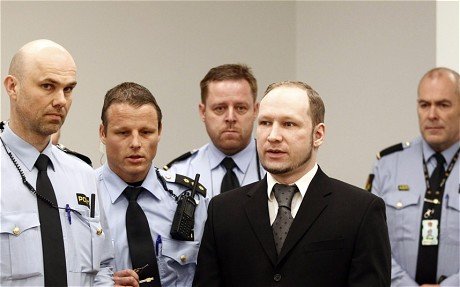
Anders Behring Breivik says his killings in Norway last July were "a small barbarian act to prevent a larger barbarian act
In his other evidence on Monday, Anders Breivik said he:
• believed political leaders would be “emotionally unstable” and would instruct police to execute him after his arrest at Utoeya
• told police he believed his family might be executed after his actions
• considered at one stage stealing a small plane from a nearby airfield to flee after his actions
• planned to make a video recording of himself decapitating former PM Gro Harlem Brundtland while reading a prepared text spelling out her “crimes”
• repeatedly replied “no comment” to any questions about other members of an anti-Muslim network called the Knights Templar, which Anders Breivik says he belongs to but which prosecutors believe does not exist
Anders Breivik admits killing all 77 victims, but denies criminal responsibility, saying he was defending Norway from multiculturalism.
He said he had envisaged the most important attack as being the Oslo bombing, but Utoeya “became the most important attack when the government building did not collapse” as planned.
Depending on whether he is found sane or not, he faces either prison or committal to a psychiatric institution.
Anders Breivik himself maintains he is sane, but a practitioner of political extremism.
In earlier statements to the court, he insisted he was “under normal circumstances a very nice person, very caring about those around me”.
He said he “absolutely” understood why his testimony was horrifying to others.
But said he had embarked on a deliberate programme of “dehumanization” in 2006 to prepare to carry out killings.
Anders Breivik has been allocated five days in total to give evidence, with the entire proceedings expected to last 10 weeks.
In the fifth day of his trial, Anders Behring Breivik has described how he shot people who were “begging for their lives” during Utoeya island rampage in which 69 people died last July.
Testifying before an Oslo court, Anders Breivik described seeing people curled up and “completely paralyzed” as he reloaded his weapon and shot them in the head.
Earlier Anders Breivik, 33, said he was normally a nice person but had shut off his emotions to carry out the attacks.
The main aim of the trial is to decide whether he is sane or insane.
On 22 July 2011, Anders Breivik set off a car bomb near government buildings in Oslo, killing eight, and then massacred 69 participants in a Labour Party youth camp on the nearby island of Utoeya.
In Friday’s testimony, Anders Breivik said he had arrived on the island dressed as a policeman, and told security officials at the camp he had been posted there following the bombings in the capital.
Anders Breivik then described in chilling detail how he killed people.
Before shooting his first victims, Anders Breivik said he had “100 voices” in his head telling him not to do it.
But after that moment of hesitation, he said he pulled the trigger, shot two people in the head and moved on.
Displaying no emotion, Anders Breivik went on to say he had entered a cafe where several people were hiding.
“Some of them are completely paralyzed. They cannot run,” he said.
“Two people were curled up.”
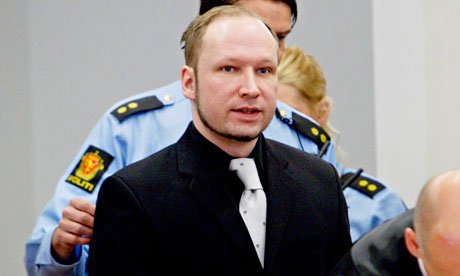
In the fifth day of his trial, Anders Behring Breivik has described how he shot people during Utoeya island rampage
Anders Breivik said he reloaded after running out of ammunition.
“People were begging for their lives. I just shot them in the head.”
Others pretended to be dead, he added, but he knew they had not been wounded and shot them too.
Anders Breivik continued his rampage around the island, luring youths from hiding places by telling them he was a police officer who was there to protect them.
When they came out, he said: “I shot towards many of them aiming at their heads.”
The stunned silence in the courtroom was replaced with tears.
Anders Breivik admits killing all 77 victims but denies criminal responsibility, saying he was defending Norway from multiculturalism.
He said he had envisaged the most important attack as being the Oslo bombing, but Utoeya “became the most important attack when the government building did not collapse” as planned.
Depending on whether he is found sane or not, he faces either prison or committal to a psychiatric institution.
Anders Breivik himself maintains he is sane but a practitioner of political extremism.
Earlier on Friday, he insisted he was “under normal circumstances a very nice person, very caring about those around me”.
He said he “absolutely” understood why his testimony was horrifying to others.
But said he had embarked on a deliberate programme of “dehumanization” in 2006 to prepare to carry out killings.
Anders Breivik added that empathy was not possible, as he would “break down mentally” if he tried to comprehend what he had done.
Asked if he could feel sadness, Anders Breivik said “yes”, saying the funeral of a friend’s brother had been his “saddest day”.
In additional points, Anders Breivik:
• claimed he had not wished to kill “civilians” when he had targeted the government buildings in Oslo, only “government targets”, but it was impossible to exclude “civilian” deaths entirely
• said that from 2006 he had studied the weaknesses and strengths of organizations from the IRA to al-Qaeda, concluding that the most successful was al-Qaeda, because they “embrace martyrdom” – “and that is key to the successful resistance fight”.
• said it was impossible for “cultural conservatives” like him to get any of their ideas published in the media or in books, due to an alleged project to protect liberal beliefs
• said he believed Japan and South Korea were ideal states, as they had “taken a stand against multiculturalism and Marxism in the 1970s”
In Thursday’s testimony, Anders Breivik said he hoped his car bomb in Oslo would kill the whole government, and had also hoped to kill all those on Utoeya – more than 500 in all.
Anders Breivik’s evidence is scheduled to last five days, concluding on Monday. The entire proceedings are expected to last 10 weeks.
[youtube moj6gKjmXZA]
Norwegian mass killer Anders Behring Breivik has told his trial in Oslo he believes there can be only two “just” outcomes to his trial – acquittal or the death penalty.
Anders Breivik, 33, who killed 77 people last July, said he considered a lengthy jail sentence “a pathetic punishment”. Norway does not have the death penalty.
He also said he had been “very surprised” to have survived the day of the attacks.
Prosecutors have been quizzing him on his links with militant nationalists.
On the third day of the trial they have been trying to disprove Anders Breivik’s claim of the existence of a far-right European network.
Under cross-examination, Anders Breivik said: “There are only two just and fair outcomes of this trial – acquittal or capital punishment. I consider 21 years of prison as a pathetic punishment.”
Asked if he wanted the court to give him the death penalty, Anders Breivik replied: “No, but I would have respected it. I would not recognize 21 years of prison, it’s ridiculous.”
Anders Breivik killed 69 people at a Labour Party youth camp on Utoeya island, having first set off a bomb outside a government building in Oslo that killed eight people.
He has said he carried out the attacks to defend “ethnic Norwegians” from rising multiculturalism.
“I was very surprised that I survived that day,” Anders Breivik told the court on Wednesday.
“I had no other plans for what to do. I considered the chance less than 5% that I would survive the bombing. But not only that, I survived Utoeya.”
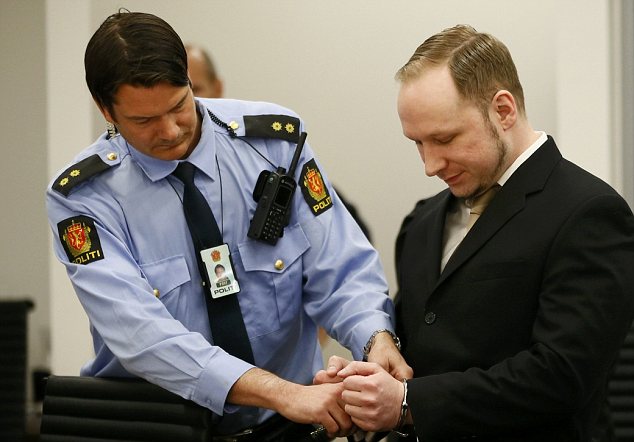
Anders Breivik has told his trial in Oslo he believes there can be only two "just" outcomes to his trial, acquittal or the death penalty
Anders Breivik was also questioned about his religious beliefs by a lawyer for the victims.
“Well, I am a militant Christian; to prevent the de-Christianisation of Europe is very important,” he said.
“But this does not mean we want to introduce a Christian theocracy. We are not Christian fundamentalists. I believe in God and I believe in a life after death.”
Answering questions from a judge he described himself as an “anti-Nazi”.
“A National Socialist would say, <<Norway for the Norwegians>>. I am more liberal, I would accept 2% perhaps [of the population not being ethnically Norwegian].”
The court is seeking to establish whether Anders Breivik is sane and can be jailed.
Earlier, Anders Breivik said the far-right network, which he named as the Knights Templar, met in London to decide on its platform.
He said the group was “not an organization in a conventional sense” but consisted of “independent cells”.
Prosecutor Inga Bejer Engh told him the purpose of her questioning was to shed doubt on the network’s existence.
In other parts of his testimony on Wednesday, Anders Breivik told the court:
• the “big problem” for militant nationalists in Europe was that they had had very few role models since World War II
• he and other militant nationalists were “selling dreams” to inspire others
• he met a Serb nationalist in Liberia in 2001 who was one of the founding members of the Knights Templar
• he met his English “mentor”, whose codename he gave as Richard the Lionheart, in London
• his own codename was Sigurd, after a 12th Century Norwegian king
The prosecution showed the court an excerpt from Anders Breivik’s 1,500-page manifesto.
He wrote that he underwent a “complete screening and background check” for the Knights Templar to ensure that he was of “the desired calibre”.
He claimed the group was considering “several hundred” individuals throughout Europe for a training course.
Anders Breivik has begun each court appearance with a right-wing clenched-fist salute.
His lawyers, addressing reporters after the day’s hearing was adjourned, said they had asked him to stop making the gesture.
Anders Breivik’s testimony, and that of his witnesses, is not being broadcast. His testimony is expected to last for a total of five days.
The leader of a support group for survivors of the 22 July attacks and victims’ families says Anders Breivik will be judged as a mass murderer, not as a man with a political agenda.
“The focus from our point of view is that he is not tried for his political views; he is on trial because he killed people, killed youngsters on Utoeya and my colleagues in the government quarters and that is the main focus for us,” said Trond Blattmann.
A contradictory picture of Anders Breivik is emerging – a man who hates Muslims, but admired Osama Bin Laden and al-Qaeda.
Anders Breivik sees himself as a great Crusader, when in fact he was a high school drop out, a failed businessman and an addict of computer war games.
Earlier, Anders Breivik’s lawyers warned that many Norwegians would find his comments upsetting.
If Anders Breivik is judged sane and found guilty of murder, he faces a maximum of 21 years in jail, although that can be extended if he is deemed a threat to the public.
If he is judged to be insane, Anders Breivik will be committed to a psychiatric institution.
Prosecution plans for Anders Breivik questioning:
• Wednesday: Anders Breivik’s thinking and life from 2001
• Thursday: Bombing of government offices in Oslo
• Friday: Shootings on Utoeya island
• Monday: Events after the bombing and shootings
[youtube pctOsOIGYpU]
The trial of Anders Behring Breivik, the man accused of killing 77 people in bomb and gun attacks in Norway last July, has been adjourned while the court decides if a lay judge should be dismissed for bias.
The court heard that one of the lay judges in the case wrote last July that Anders Behring Breivik should face the death penalty.
When the trial resumes, Anders Breivik will read out a prepared statement.
He admits a car bombing in Oslo and attacking a youth camp.
However, Anders Breivik has pleaded not guilty to acts of terror and mass murder, claiming he had acted to protect Norway from multi-culturalism and Islam.
Anders Breivik, 33, has also said that he does not recognize the court.
Lawyers in the case have asked for the judge to be dismissed and the court was adjourned for 30 minutes to decide what action to take.
A lay judge is an ordinary member of the public who forms part of the judgement panel. If the judge is dismissed, there are two possible replacements who were observing proceedings yesterday and who could step in to allow the trial to continue as scheduled.
As he entered the courtroom, Anders Breivik smiled and, as he did on Monday, gave a far-right closed-fist salute before he sat down. This is the first time that Anders Breivik will be able to present his case in person.
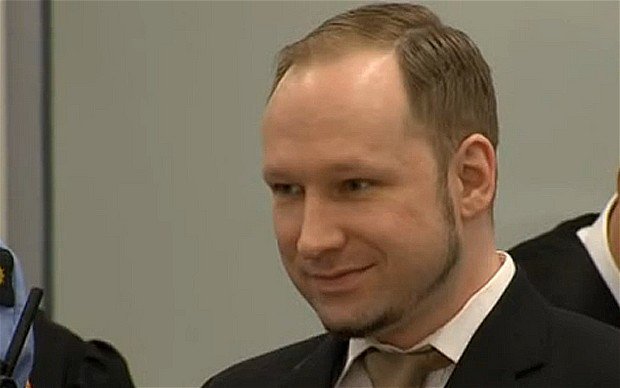
The trial of Anders Behring Breivik has been adjourned while the court decides if a lay judge should be dismissed for bias
Anders Breivik’s defense team has already warned that many Norwegians will find his testimony upsetting.
Instead of expressing remorse, Anders Breivik is expected to say he regrets not having killed more people.
On Monday, prosecutors played harrowing recordings of the events and described the fate of each victim in detail.
Throughout the evidence Anders Breivik remained emotionless, although he broke down weeping when the court played a 12-minute anti-Islam video which he had posted online on the day of the carnage.
Anders Breivik’s lawyer, Geir Lippestad, later said that his client appeared to have cried over feelings that his attacks were “cruel but necessary… to save Europe from an ongoing war”.
Geir Lippestad said he understood that victims’ families were worried Anders Breivik would use his trial as a pulpit.
“On the other hand – and this is important – he has a right to explain himself, a fundamental right under Norwegian law and a human right,” he added.
Parts of the trial are being broadcast on television, although the court will not allow Anders Breivik’s testimony or that of his witnesses to be broadcast.
Anders Breivik detonated a bomb in a van parked outside government offices in Oslo on 22 July, killing eight people.
He then travelled to Utoeya where, dressed as a police officer, he shot dead a further 69 people who were attending a youth camp run by the governing Labour party.
Survivors and relatives of the victims gasped as previously unreleased footage was shown in court of people walking towards Anders Breivik’s parked van as it exploded outside the government block.
The court also heard Anders Breivik’s calls to police offering to give himself up.
“I have completed my operation and I want to surrender,” Anders Breivik said.
One of the questions at the heart of this trial, which is expected to last for 10 weeks, is Anders Breivik’s mental state.
He was found insane in one examination, while a second assessment made public last week found him mentally competent.
If the court decides he is criminally insane, Anders Breivik will be committed to psychiatric care; if he is judged to be mentally stable, he will be jailed if found guilty.
If jailed, he faces a sentence of 21 years which could be extended to keep him behind bars for the rest of his life.
The courtroom has been specially built for the trial to accommodate more than 200 people.
Glass partitions have been put up to separate the victims and their families from Anders Breivik.
[youtube 0oDDSxRLrcU]
Anders Behring Breivik, the man who carried out bomb and gun attacks in Norway last year which left 77 people dead, has pleaded not guilty at the start of his trial in Oslo.
Anders Breivik, 33 attacked a youth camp organized by the governing Labour party on the island of Utoeya, after setting off a car bomb in the capital.
He told the court he “acknowledged” the acts committed, but said he did not accept criminal responsibility.
The prosecution earlier gave a detailed account of how each person was killed.
If the court decides he is criminally insane, he will be committed to psychiatric care; if he is judged to be mentally stable, he will be jailed.
In the latter case, Anders Breivik faces a sentence of 21 years, which could be extended to keep him behind bars for the rest of his life.
He was found insane in one examination, while a second assessment made public last week found him mentally competent.
Dressed in a dark suit, Anders Breivik smiled as he entered the courtroom and a guard removed his handcuffs. He then gave a closed-fist salute.
He later told the lead judge, Wenche Elisabeth Arntzen: “I do not recognize the Norwegian courts. You have received your mandate from political parties which support multiculturalism.”
He also said he did not recognize the authority of Judge Arntzen, claiming she was friends with the sister of former Prime Minister and Labour party leader Gro Harlem Brundtland.
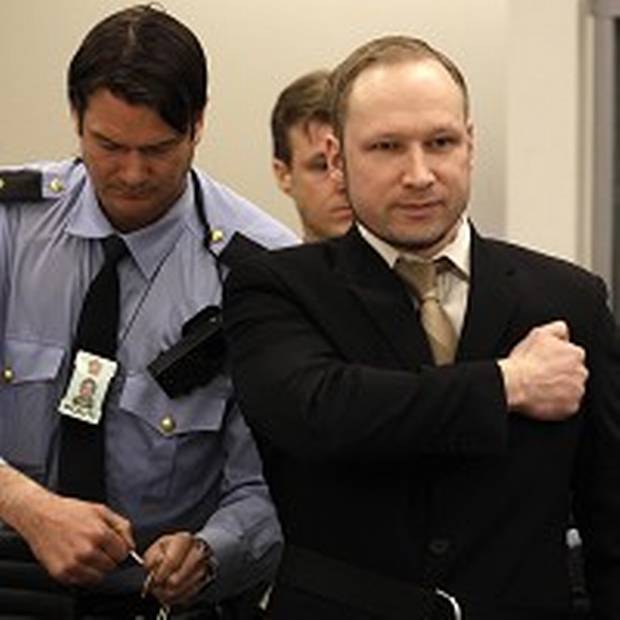
Anders Behring Breivik has pleaded not guilty at the start of his trial in Oslo
The judge noted the objections, which Anders Breivik’s lawyer said were not official, and said the defense could follow up on them in their opening arguments.
Anders Breivik described his occupation as a “writer”, currently working from prison.
Prosecutor Inga Bejer Engh read out the charges against him and gave an extensively detailed account of how each person was killed or injured in last year’s attacks.
The prosecutor said the attacks “created fear in the Norwegian population”, adding: “The defendant has committed very serious crimes, on a scale which hasn’t been experienced in our country in modern times.”
Anders Breivik showed no emotion, looking down at the table in front of him.
At the end of the indictment, he told the court: “I acknowledge the acts, but not criminal guilt – I claim I was doing it in self-defense.”
Anders Breivik has already confessed to the attacks on 22 July. In the car bombing outside government buildings in Oslo, eight people were killed and 209 wounded.
He killed 67 people and wounded 33 – most of them teenagers – in his shooting spree at the youth camp on Utoeya. A further two people died by falling or drowning.
At a court hearing in February, Anders Breivik said his killing spree was “a preventative attack against state traitors”, who were guilty of “ethnic cleansing” because they supported a multicultural society.
His lawyer has said his only regret is that “he did not go further”.
“It is difficult to understand, but I am telling you this to prepare people for his testimony,” Geir Lippestad told reporters before the trial.
Investigators have found no evidence to support Anders Breivik’s claims that he belonged to a secret “resistance” movement, the “Knights Templar”, named after a military and religious order founded during the Crusades to fight the enemies of Christendom.
“In our opinion such a network does not exist,” prosecutor Svein Holden told the court on Monday.
A 12-minute-long film about the evils of “multiculturalism” and “Islamic demographic warfare”, which Breivik posted online on the day of the attacks, was shown in court before the trial was adjourned for lunch. As it concluded, he could be seen wiping tears from his eyes.
Later, previously unreleased surveillance footage of the Oslo bombing was shown.
Some of the survivors and relatives of those killed reportedly gasped after footage was played of Anders Breivik’s explosives-packed vehicle exploding, followed by scenes of panic as people fled and pieces of metal fell to the ground. But the defendant was impassive, and at times even smirked.
The court later adjourned for the day.
At a news conference following the adjournment, Geir Lippestad said Anders Breivik considered he was at war and therefore felt he should be tried by “a war tribunal”.
Asked about Anders Breivik’s tears during the first day, he said “part of the explanation” might be that his client considered his actions “necessary to prevent a war in Europe”.
Parts of the trial will be shown on television, but the court will not allow Anders Breivik’s testimony or that of his witnesses to be broadcast. Anders Breivik is scheduled to take the stand for about a week, starting on Tuesday.
With Anders Breivik not expected to express any remorse for his actions, his trial promises to be an ordeal for the families of those killed and for those who survived.
Jorid Nordmelan, a survivor of the Utoeya massacre, said she would be in court to hear Anders Breivik testify.
“It’s a historical date for Norwegians,” she said.
“We never had a trial like this, so we don’t know what’s going to happen.
“Prosecutors told me they were going to make the opening statements awful, so that people can just feel what he did right there.”
Police have sealed off streets around the courtroom, which was specially built for the trial to accommodate more than 200 people. Glass partitions have been put up to separate the victims and their families from Anders Breivik.
[youtube lGwRKY0NzKM]





